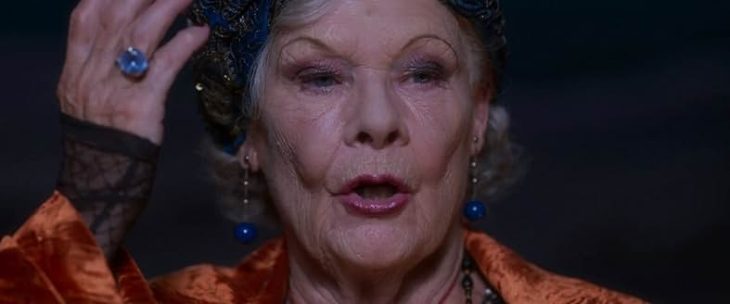
Word of the Day: Blithe
Today’s word of the day, thanks to Words Coach (https://www.wordscoach.com/dictionary), is blithe. Pronounced either / blaɪð / or / blaɪθ /, the adjective means “without thought or regard; carefree; heedless” or “joyous, merry, or happy in disposition” (https://www.dictionary.com/browse/blithe). The θ is called theta, and in the International Phonetic Alphabet it represents the voiceless dental fricative, as we say that th sound in the word both. The ð is the voiced dental fricative, like the th in the word then. Samuel Johnson, in his 1755 Dictionary, defines it as “Gay; airy; merry; joyous; sprightly; mirthful” (https://johnsonsdictionaryonline.com/views/search.php?term=blithe).
Johnson says that the word derives from “Saxon” (ibid.). That is his way of saying Old English or Anglo-Saxon. And that is what Etymonline.com says, that it’s from “Old English bliþe ‘joyous, kind, cheerful, pleasant,’ from Proto-Germanic *blithiz ‘gentle, kind’ (source also of Old Saxon bliði ‘bright, happy,’ Middle Dutch blide, Dutch blijde, Old Norse bliðr ‘mild, gentle,’ Old High German blidi ‘gay, friendly,’ Gothic bleiþs ‘kind, friendly, merciful’). Related: Blithely.
“No cognates outside Germanic. ‘The earlier application was to the outward expression of kindly feeling, sympathy, affection to others, as in Gothic and ON.; but in OE. the word had come more usually to be applied to the external manifestation of one’s own pleased or happy frame of mind, and hence even to the state itself’ [OED]. Rare since 16c.” (https://www.etymonline.com/word/blithe).
Blithe might be rare since the 16th century, but I can think of at least two times when it has been used in a very public way, and one is related to the other.
The English comic playwright Noel Coward (1899-1973), who wrote over 65 plays, more than 20 of which were turned into movies, was one of the most popular playwrights in English in the first half of the 20th century (https://en.wikipedia.org/wiki/No%C3%ABl_Coward). He grew up relatively poor in a suburb of London, but despite the circumstances, the theater bug bit him early on. His professional career actually began when he was just 12 years old.
He played in his own play, I’ll Leave It to You, when he was just 20 years old, and the play did well enough in Manchester that it moved down to London (ibid.).
“In 1924, Coward achieved his first great critical and financial success as a playwright with The Vortex. The story is about a nymphomaniac socialite and her cocaine-addicted son (played by Coward). Some saw the drugs as a mask for homosexuality;Kenneth Tynan later described it as ‘a jeremiad against narcotics with dialogue that sounds today not so much stilted as high-heeled’. The Vortex was considered shocking in its day for its depiction of sexual vanity and drug abuse among the upper classes. Its notoriety and fiery performances attracted large audiences, justifying a move from a small suburban theatre to a larger one in the West End” (ibid.)
“Coward’s most enduring work from the years was the hugely successful black comedy Blithe Spirit (1941), about a novelist who researches the occult and hires a medium. A séance brings back the ghost of his first wife, causing havoc for the novelist and his second wife. With 1,997 consecutive performances, it broke box-office records for the run of a West End comedy, and was also produced on Broadway, where its original run was 650 performances. The play was adapted into a 1945 film, directed by [David] Lean” (ibid.).
“The title of the play is taken from Shelley’s poem ‘To a Skylark’, (‘Hail to thee, blithe Spirit! / Bird thou never wert’)” (https://en.wikipedia.org/wiki/Blithe_Spirit_(play)).
“”To a Skylark” is a poem completed by Percy Bysshe Shelley in late June 1820 and published accompanying his lyrical drama Prometheus Unbound by Charles and James Ollier in London.
“It was inspired by an evening walk in the country near Livorno, Italy, with his wife Mary Shelley, and describes the appearance and song of a skylark they come upon. Mary Shelley described the event that inspired Shelley to write ‘To a Skylark’: ‘In the Spring we spent a week or two near Leghorn (Livorno) … It was on a beautiful summer evening while wandering among the lanes whose myrtle hedges were the bowers of the fire-flies, that we heard the carolling of the skylark’” (https://en.wikipedia.org/wiki/To_a_Skylark).
In addition to the poem and the play, I have heard the word blithe used occasionally, so perhaps it is not as rare as Etymonline.com suggests.
Today’s image is of Dame Judi Dench, who played Madame Arcati, the medium in 2020 film version of Blithe Spirit (https://www.imdb.com/title/tt10334148/characters/nm0001132/?ref_=mv_close).